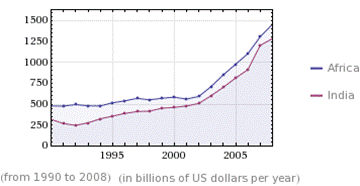A previous article introduced the “Broadcast, Interactive, Internet and Hybrid TV in Africa (TVA): Conference and Exhibition” (4-8 July 2011 at the Sandton Convention Centre, Johannesburg, South Africa.) Based on a number of courses I’ve given in the region over the past year on Hybrid TV, OTT (Over the Top) TV, IPTV, SDP (Service Deliver Platform), Managed Services, Next Generation Support Systems and IMS (IP Multimedia Subsystem) I think the market has ignored the potential of Africa as it transitions to digital TV through 2011/2012. What has surprised me in many conversations sparked from that article is how Africa is not in the radar of many companies.
Africa is wealthier than India, see graph below on comparative GDP, courtesy of WolframAlpha, which should be a default search engine. Urbanization is the dominant demographic trend, 52 cities have a population of more than a million. That’s the same number as Europe and more than China. 40% of Africans live in cities, the same number as China and greater than India. About 90 million people earn more than $5k (USD) per year, a level of income which allows more than half to be spent on non-food items, that is discretionary spending, a critical sign of long-term prosperity as it drives consumer-led spending (see America’s economy for evidence of what can be achieved). Africa has a greater number of households earning more than $20k per year than India. There are 1B consumers on the African continent. At current prices, African consumer spending is around $1T per year, which is larger than that of Russia or India.
Most multinationals serve the 150 million ‘Africa 1’ market of the upper middle class and above, leaving a 500 million ‘Africa 2’ middle-market that is vastly under-served. This is comparable in purchasing power to their equivalent in India and China. As we’ve seen with Safaricom in Kenya, mobile banking has exploded, banking is exploding across the continent. Credit card, debit card and mobile payment systems have grown at dramatic rate of >500% per year. Credit rating agencies, installment purchasing, and many other basics we take for granted in more mature markets have reached critical mass. The relative lack of traditional infrastructure in many market segments creates an opportunity for communications technologies to innovate in sectors normally blocked by incumbents in more mature markets.
To evaluate the Africa market, then set a priority is OK. But I’m seeing too many companies make assumptions about and then discount the African market. It’s the last high growth market in the world, and its time has potentially come for a consumer-driven explosion in consumption aided by the low transaction costs of communication based technologies.
